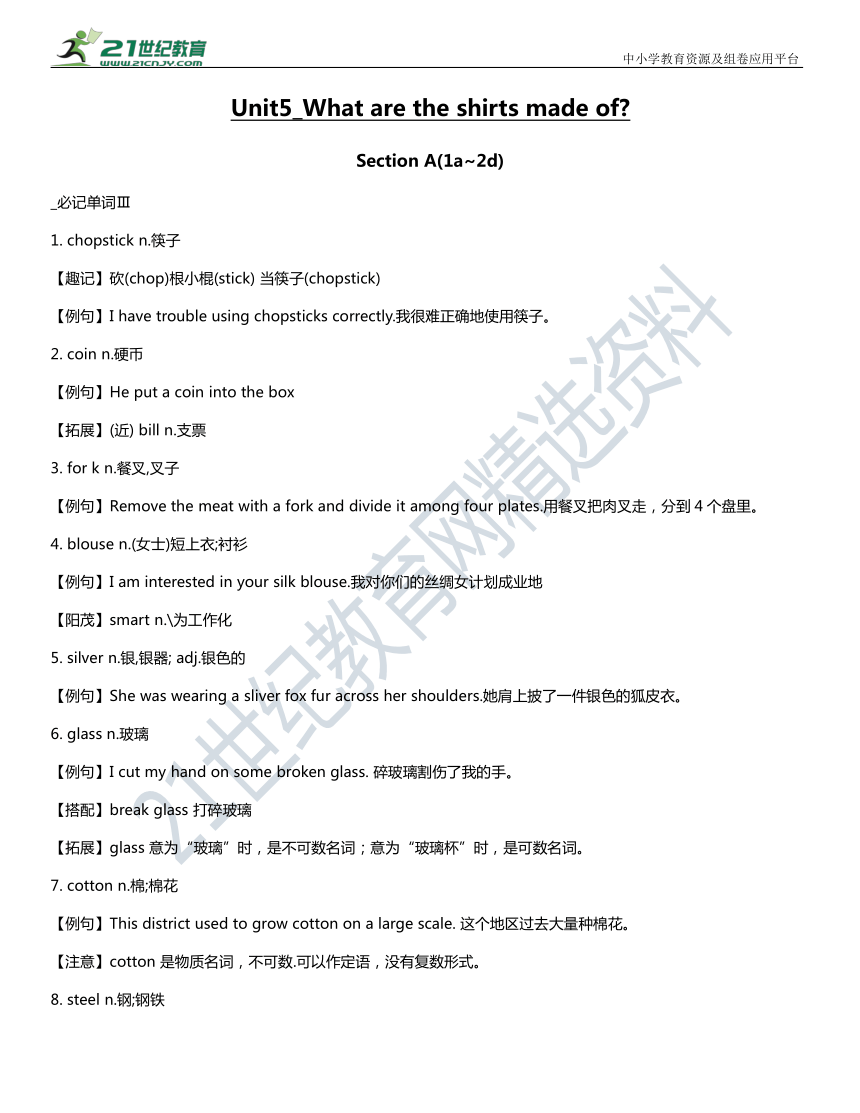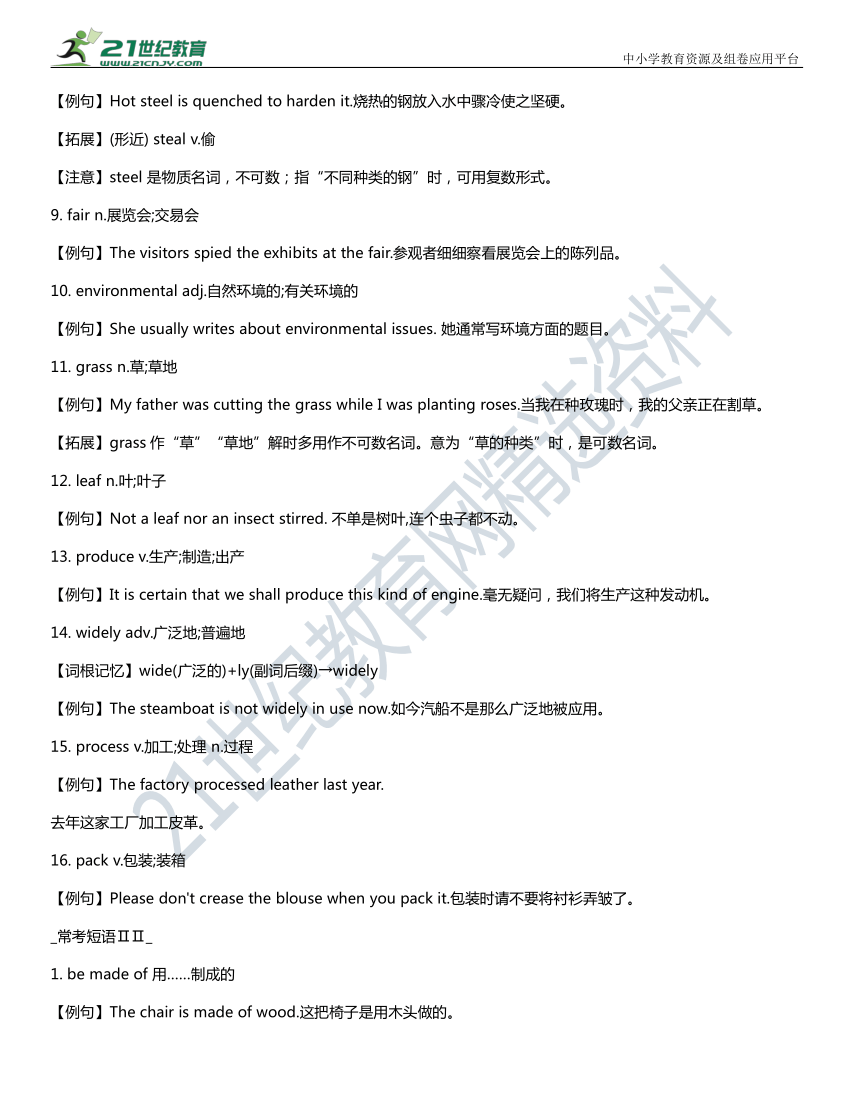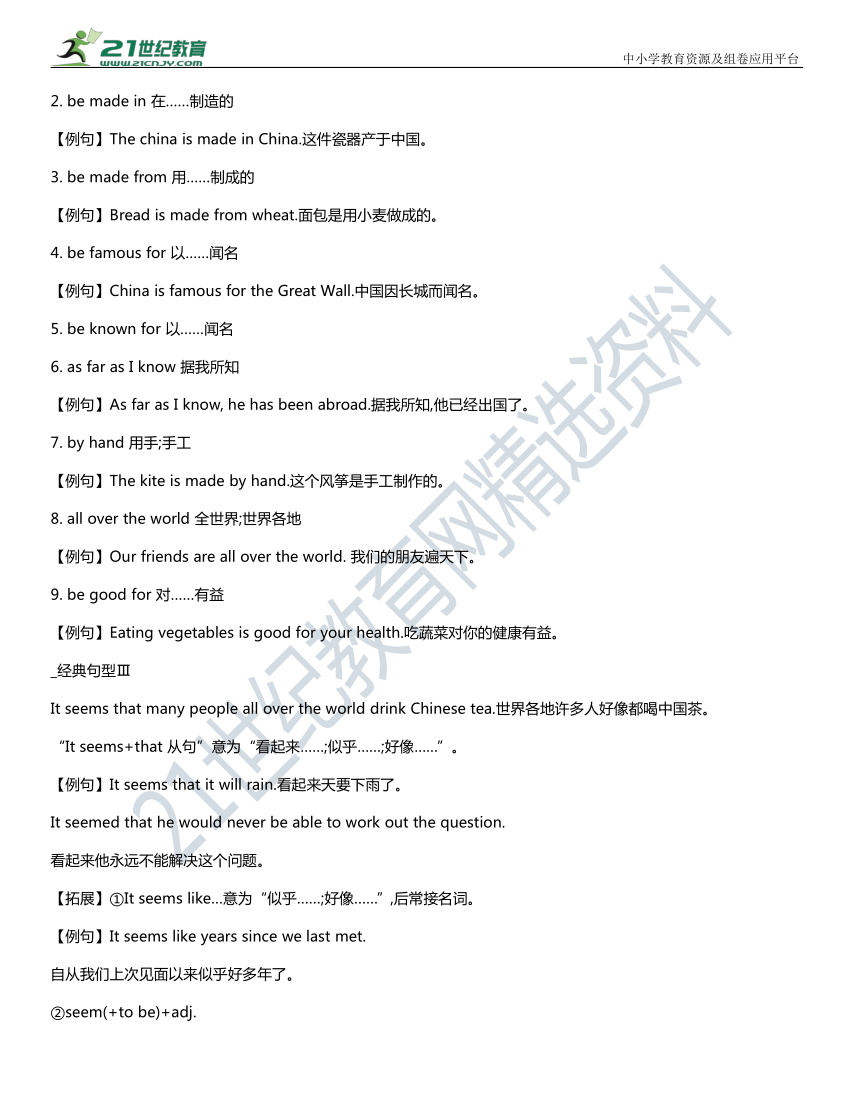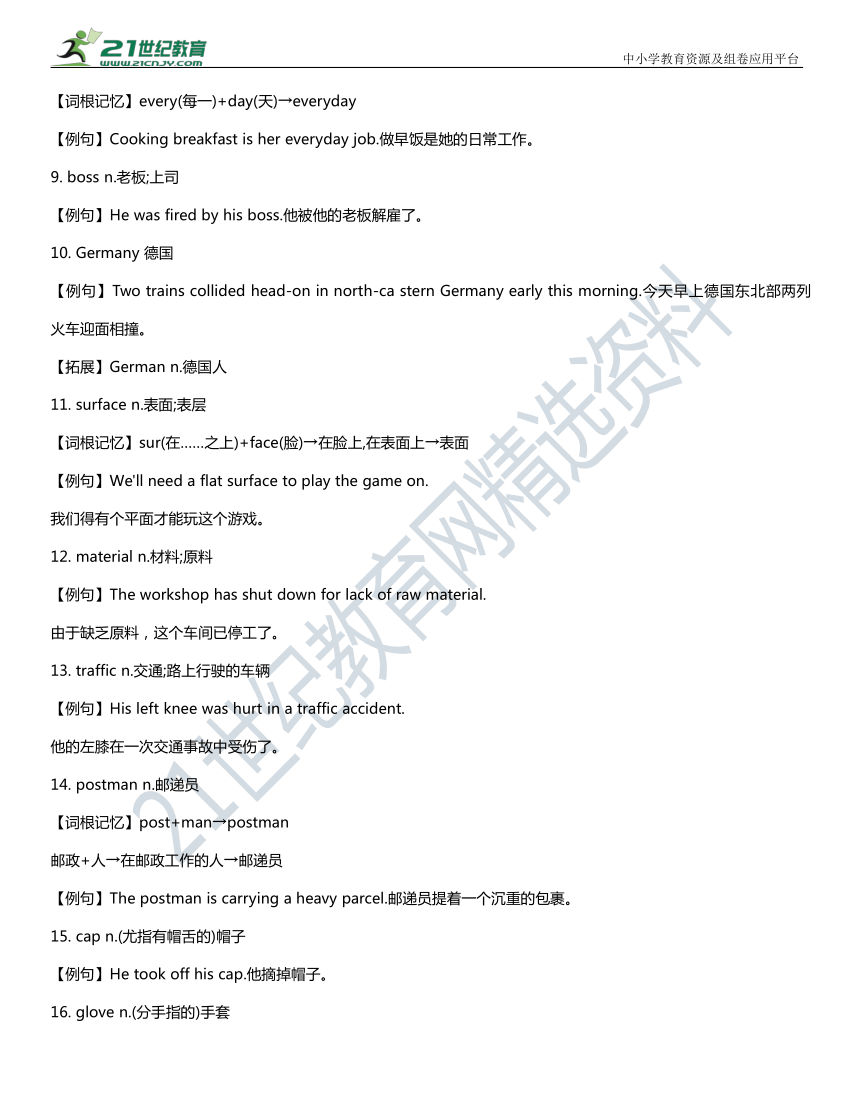Unit5 What are the shirts made of?单元知识点归纳 人教版九年级英语全一册
文档属性
| 名称 | Unit5 What are the shirts made of?单元知识点归纳 人教版九年级英语全一册 |  | |
| 格式 | docx | ||
| 文件大小 | 165.1KB | ||
| 资源类型 | 试卷 | ||
| 版本资源 | 人教新目标(Go for it)版 | ||
| 科目 | 英语 | ||
| 更新时间 | 2023-09-09 15:58:09 | ||
图片预览





文档简介
中小学教育资源及组卷应用平台
Unit5_What are the shirts made of
Section A(1a~2d)
_必记单词Ⅲ
1. chopstick n.筷子
【趣记】砍(chop)根小棍(stick) 当筷子(chopstick)
【例句】I have trouble using chopsticks correctly.我很难正确地使用筷子。
2. coin n.硬币
【例句】He put a coin into the box
【拓展】(近) bill n.支票
3. for k n.餐叉,叉子
【例句】Remove the meat with a fork and divide it among four plates.用餐叉把肉叉走,分到4个盘里。
4. blouse n.(女士)短上衣;衬衫
【例句】I am interested in your silk blouse.我对你们的丝绸女计划成业地
【阳茂】smart n.\为工作化
5. silver n.银,银器; adj.银色的
【例句】She was wearing a sliver fox fur across her shoulders.她肩上披了一件银色的狐皮衣。
6. glass n.玻璃
【例句】I cut my hand on some broken glass. 碎玻璃割伤了我的手。
【搭配】break glass 打碎玻璃
【拓展】glass 意为“玻璃”时,是不可数名词;意为“玻璃杯”时,是可数名词。
7. cotton n.棉;棉花
【例句】This district used to grow cotton on a large scale. 这个地区过去大量种棉花。
【注意】cotton 是物质名词,不可数.可以作定语,没有复数形式。
8. steel n.钢;钢铁
【例句】Hot steel is quenched to harden it.烧热的钢放入水中骤冷使之坚硬。
【拓展】(形近) steal v.偷
【注意】steel 是物质名词,不可数;指“不同种类的钢”时,可用复数形式。
9. fair n.展览会;交易会
【例句】The visitors spied the exhibits at the fair.参观者细细察看展览会上的陈列品。
10. environmental adj.自然环境的;有关环境的
【例句】She usually writes about environmental issues. 她通常写环境方面的题目。
11. grass n.草;草地
【例句】My father was cutting the grass while I was planting roses.当我在种玫瑰时,我的父亲正在割草。
【拓展】grass作“草”“草地”解时多用作不可数名词。意为“草的种类”时,是可数名词。
12. leaf n.叶;叶子
【例句】Not a leaf nor an insect stirred. 不单是树叶,连个虫子都不动。
13. produce v.生产;制造;出产
【例句】It is certain that we shall produce this kind of engine.毫无疑问,我们将生产这种发动机。
14. widely adv.广泛地;普遍地
【词根记忆】wide(广泛的)+ly(副词后缀)→widely
【例句】The steamboat is not widely in use now.如今汽船不是那么广泛地被应用。
15. process v.加工;处理 n.过程
【例句】The factory processed leather last year.
去年这家工厂加工皮革。
16. pack v.包装;装箱
【例句】Please don't crease the blouse when you pack it.包装时请不要将衬衫弄皱了。
_常考短语ⅡⅡ_
1. be made of 用……制成的
【例句】The chair is made of wood.这把椅子是用木头做的。
2. be made in 在……制造的
【例句】The china is made in China.这件瓷器产于中国。
3. be made from 用……制成的
【例句】Bread is made from wheat.面包是用小麦做成的。
4. be famous for 以……闻名
【例句】China is famous for the Great Wall.中国因长城而闻名。
5. be known for 以……闻名
6. as far as I know 据我所知
【例句】As far as I know, he has been abroad.据我所知,他已经出国了。
7. by hand 用手;手工
【例句】The kite is made by hand.这个风筝是手工制作的。
8. all over the world 全世界;世界各地
【例句】Our friends are all over the world. 我们的朋友遍天下。
9. be good for 对……有益
【例句】Eating vegetables is good for your health.吃蔬菜对你的健康有益。
_经典句型Ⅲ
It seems that many people all over the world drink Chinese tea.世界各地许多人好像都喝中国茶。
“It seems+that 从句”意为“看起来……;似乎……;好像……”。
【例句】It seems that it will rain.看起来天要下雨了。
It seemed that he would never be able to work out the question.
看起来他永远不能解决这个问题。
【拓展】①It seems like…意为“似乎……;好像……”,后常接名词。
【例句】It seems like years since we last met.
自从我们上次见面以来似乎好多年了。
②seem(+to be)+adj.
【例句】You seem(to be) unhappy.你好像不高兴。
③seem to do sth.
【例句】Your teacher seemed to know that. =It seemed that yourteacher knew that.你的老师好像知道那件事。
Section A(3a~4c)
_必记单词_|||||_
1. product n.产品;制品
【例句】The country's main products are cocoa and gold.
这个国家的主要特产是可可和黄金。
【联想】production n.生产
2. France 法国
【例句】France is the world's second-biggest exporter of agricultural products.法国是世界第二大农产品出口国。
3. local adj.当地的;本地的
【例句】This is a local problem. not a nationwide one.
这是一个当地的问题,而非全国性的。
4. brand n.品牌;牌子
【例句】What is your favorite brand of cigarettes 你最喜欢哪种牌子的香烟
5. avoid v.避免;回避
【例句】The old man avoids his neighbors.
那位老人回避他的邻居。
【搭配】avoid doing sth.避免做某事;逃避……
【例句】She was carrying a buffalo hide handbag.她拎着一个牛皮手提包。
7. mobile adj.可移动的;非固定的
【例句】In summer, her mobile home heats up like an oven.夏天一到,她的活动住房就变得像烤炉一样热。
8. everyday adj.每天的;日常的
【词根记忆】every(每一)+day(天)→everyday
【例句】Cooking breakfast is her everyday job.做早饭是她的日常工作。
9. boss n.老板;上司
【例句】He was fired by his boss.他被他的老板解雇了。
10. Germany 德国
【例句】Two trains collided head-on in north-ca stern Germany early this morning.今天早上德国东北部两列火车迎面相撞。
【拓展】German n.德国人
11. surface n.表面;表层
【词根记忆】sur(在……之上)+face(脸)→在脸上,在表面上→表面
【例句】We'll need a flat surface to play the game on.
我们得有个平面才能玩这个游戏。
12. material n.材料;原料
【例句】The workshop has shut down for lack of raw material.
由于缺乏原料,这个车间已停工了。
13. traffic n.交通;路上行驶的车辆
【例句】His left knee was hurt in a traffic accident.
他的左膝在一次交通事故中受伤了。
14. postman n.邮递员
【词根记忆】post+man→postman
邮政+人→在邮政工作的人→邮递员
【例句】The postman is carrying a heavy parcel.邮递员提着一个沉重的包裹。
15. cap n.(尤指有帽舌的)帽子
【例句】He took off his cap.他摘掉帽子。
16. glove n.(分手指的)手套
【例句】I rarely lose a left-hand glove.我很少脱下左手手套。
【搭配】a pair of gloves一副手套
_常考短语ⅡⅡ_
1. no matter 无论;不论
【例句】No matter what you say, I won't believe you.
无论你说什么,我都不会相信你。
2. in fact事实上
3. avoid doing sth.避免做某事
4. in all parts of the world 在世界各地
5. on the last Friday 在最后一个星期五
_经典句型Ⅲ
No matter what you may buy, you might think those products were made in those countries.无论你可能买什
么,你也许认为那些产品就是那些国家制造的。
no matter意为“无论;不论”,与 what, who, when, where, how等疑问词连用,引导让步状语从句。在从句中,常用一般现在时
表示将来,状语从句可放在主句前或主句后。
【例句】No matter who you are, you must obey the rules.
无论你是谁,都必须遵守规则。
【拓展】“no matter+疑问词”结构相当于“疑问词+ever”。
no matter how=however(无论怎样)
no matter what=whatever(无论什么)
no matter when=whenever(无论何时)
no matter where=wherever(无论在哪里)
Section B(1a~1e)
_必记单词‖‖_
1. international adj.国际的
【词根记忆】inter+national→international
在……之间+国家的→国家之间的→国际的
【例句】We need a peaceful international environment.
我们需要和平的国际环境。
2. competitor n.参赛者;竞争者
【例句】That company is a strong competitor for us.
对于我们来说,那家公司是强有力的竞争者。
_常考短语||||_
1. fly a kite 放风筝
【例句】I flew a kite with my friends last weekend.
上周末我和朋友们放风筝了。
2. go on vacation 去度假
3. many different kinds of 许多不同种类的
【例句】There are many different kinds of books in the library.
图书馆里有许多不同种类的书。
Section B(2a~3b)
_必记单词|||||_
1. its adj.它的
【例句】He felt the cloth to see its quality.他摸摸布看它的品质。
2. form n.形式;类型
【例句】Playing basketball is one form of physical exercise.打篮球是体育活动的一种形式。
【联想】formal adj.正式的,正规的
3. clay n.黏土,陶土
【例句】Clay is a plastic substa
4. celebration n.庆典;庆祝活动
【例句】We'll hold a celebration next week.
下周我们将举行庆典。
5. balloon n.气球
【趣记】ball(球)+oon→气球
【例句】A balloon floated across the sky.有个气球从空中飘过。
6. scissors n.(pl.)剪刀
【例句】Leonardo Da Vinci invented the scissors.
达芬奇发明了剪刀。
【注意】scissors常以复数形式出现,用作主语时谓语动词用复数形式
7. lively adj.生气勃勃的;(色彩)鲜艳的
【词根记忆】live(活的,生动的)+ly(形容词后缀)→lively
【例句】He has a lively sense of humour and appears naturally
confident.他有一种活泼外向的幽默感,看上去大方自信。
【联想】live adj.活着的,生动的
8. historical adj.(有关)历史的
【例句】The book is based on historical events.
这本书是根据历史事件写成的。
9. heat n.热;高温 v.加热;变热
【例句】I can't walk about in this heat.我不能在这种酷热下走路。
10. polish v.磨光;修改;润色
【例句】It's an honest book but it hasn't been polished.这本书写是真诚坦率,但还未经润色。
【搭配】polish sth. with sth.用某物擦亮某物
polish up 改善;润色
11. complete v.完成
【例句】I must complete the letter within an hour.
我一定要在一小时内写完信。
【拓展】complete 还可以作形容词,意为“完全的;完成的;完整的”。
【搭配】complete sth. with sth.以……完成complete sth. for sth. 为某目的而完成
_常考短语Ⅲ
1. according to 根据;按照
【例句】Everything went according to plan.
一切均按照计划进行。
2. send out 放出;派遣;发送
【例句】Make sure you send it out in time.
你要确保将它及时发送出去。
3. turn into 变成
4. in trouble 处于困境中
【例句】You're always getting yourself in trouble.
你总是给自己找麻烦。
5. be covered with 用……覆盖
【例句】The ground is covered with snow.大地被雪覆盖着。
6. rise into 上升到……中
【例句】When the weather is cool, little bits of water rise into
the air and form clouds.
当天气凉时,小水滴上升到空中形成云。
7. a symbol of …… 的象征
【例句】Long noodles are a symbol of long life.
长长的面条是长寿的象征。
8. be used by 被……使用
【例句】Computers are used by many people all over the world.
世界各地的许多人都使用电脑。
9. be used for 被用于(做)……
【例句】Knives are used for cutting things.
刀子是用来切东西的。
10. at a very high heat 以高温
【例句】Steel is usually fired at a very high heat.
钢通常以高温锻造。
11. be seen as 被视作
12. put... on...把……放在……上
_经典句型_‖_
It takes several weeks to complete everything.完成这一切需要花费几周的时间。
It takes(sb.) some time to do sth.为固定句型,意为“做某事花费(某人)多长时间”。其中it为形式主语,真正的主语是后面的动词不定式短语 to do sth.。
【例句】It took me half an hour to go to school by bike yesterday.
昨天我骑自行车去上学花了半个小时的时间。
单元语法
一般现在时的被动语态
1.被动语态的含义
在英语中有两种语态,即主语语态和被动语态。
主动语态被动语态
含义主语是动作的执行者主语是动作的承受者,即行为动作的对象
例句Many people speakEnglish.许多人讲英语。English is spoken by manypeople.英语被许多人讲。
说明谓语 speak 这一动作是由主语 manypeople来执行的主语 English 是 speak这一动作的承受者
2.被动语态的构成
被动语态由“助动词be+及物动词的过去分词”构成。助动词
be有人称、时态和数的变化。
3.被动语态的用法:当说话者不知道动作的执行者或没有必要指出动作的执行者时,只需要强调动作的承受者,可以使用被动语态。如果需要在被动语态中指出动作的执行者时一般用介词by引出。
4.一般现在时的被动语态的构成:在一般现在时态的句子中,被动语态由“bc(am/is/arc)+及词be随人称、数的变化而改变。
This knife is made of wood and metal.
这把刀是用木头和金属制造的。
5.主动语态改写成被动语态的方法:将主动句的宾语变成主语,将主动句的谓语变成“be+及物动词的过去分词”,主动句的主语变成被动句中 by的宾语(或省略)。
主动句:主语+谓语+宾语
被动句:主语+be+及物动词的过去分词+by+宾语Most middle school students play football.
主语 谓语 宾语
Football is played by most middle school students
大部分中学生踢足球。
注意:如果主动句中有两个宾语(直接宾语和间接宾语),可以把其中任意一个变成被动句的主语。
My teacher gives me a lot of books.(主动语态)主语谓语间宾直宾
被动语态:I am given a lot of books by my teacher.
被动语态:A lot of books are given to me by my teacher.
6.一般现在时的被动语态的句式变化:
结构例句
肯定句主语+am/is/are+及物动词的过去分词+其他。The kite is made by Mary. 这个风筝是玛丽做的。
一般疑问句及其答语Am/Is/Are + 主语+及物动词的过去分词+其他 Is the kite made by Mary 这个风筝是玛丽做的吗
肯定回答Yes,主语+ am/is/are.Yes, it is.对,是的。
否定回答No,主语+isn't/aren't. 或 No, I'mnot.No, it isn't.不,不是。
否定句主语+am/is/are+not+及物动词的过 去 分 词+其他。The kite isn't made by Mary. 这个风筝不是玛丽做的。
助记:一般现在时的被动语态
一般现在时,被动用be done, be有am, is, are.否定be后加not,疑问 be放主语前。
【例1】—How clean your car is!
—Thank you. It _very often.
A. is washedB. washes
C. was washedD. washed
【解析】我们可用“分析句子结构法”解答此题。分析句子结构可知,主语 it 是谓语动词 wash动作的承受者,要用被动语态。由句中的often可知用一般现在时态,一般现在时的被动语态结构为:am/is/are+及物动词的过去分词。句子主语 it 是第三人称单数, be动词应用 is,故选 A。
【答案】A
【例2】—Don’t smoke here, Dad. Smoking _in public
place.
—Oh, sorry, I'll stop right now.
A. isn't allowedB. aren't allowed
C. doesn't allowD. not allowed
【解析】我们可用“语法分析法”解答此题。根据题干和选项可知前两句句意为“爸爸,不要在这里吸烟。在公共场所吸烟是不被允许的”。smoking 是动词 allow 表示的动作的承受者,句子应用被动语态,其谓语结构为“be+done”,排除 C、D两项;单个动名词作主语时谓语动词用单数形式,故排除 B项,选A。
【答案】A
Unit5_What are the shirts made of
Section A(1a~2d)
_必记单词Ⅲ
1. chopstick n.筷子
【趣记】砍(chop)根小棍(stick) 当筷子(chopstick)
【例句】I have trouble using chopsticks correctly.我很难正确地使用筷子。
2. coin n.硬币
【例句】He put a coin into the box
【拓展】(近) bill n.支票
3. for k n.餐叉,叉子
【例句】Remove the meat with a fork and divide it among four plates.用餐叉把肉叉走,分到4个盘里。
4. blouse n.(女士)短上衣;衬衫
【例句】I am interested in your silk blouse.我对你们的丝绸女计划成业地
【阳茂】smart n.\为工作化
5. silver n.银,银器; adj.银色的
【例句】She was wearing a sliver fox fur across her shoulders.她肩上披了一件银色的狐皮衣。
6. glass n.玻璃
【例句】I cut my hand on some broken glass. 碎玻璃割伤了我的手。
【搭配】break glass 打碎玻璃
【拓展】glass 意为“玻璃”时,是不可数名词;意为“玻璃杯”时,是可数名词。
7. cotton n.棉;棉花
【例句】This district used to grow cotton on a large scale. 这个地区过去大量种棉花。
【注意】cotton 是物质名词,不可数.可以作定语,没有复数形式。
8. steel n.钢;钢铁
【例句】Hot steel is quenched to harden it.烧热的钢放入水中骤冷使之坚硬。
【拓展】(形近) steal v.偷
【注意】steel 是物质名词,不可数;指“不同种类的钢”时,可用复数形式。
9. fair n.展览会;交易会
【例句】The visitors spied the exhibits at the fair.参观者细细察看展览会上的陈列品。
10. environmental adj.自然环境的;有关环境的
【例句】She usually writes about environmental issues. 她通常写环境方面的题目。
11. grass n.草;草地
【例句】My father was cutting the grass while I was planting roses.当我在种玫瑰时,我的父亲正在割草。
【拓展】grass作“草”“草地”解时多用作不可数名词。意为“草的种类”时,是可数名词。
12. leaf n.叶;叶子
【例句】Not a leaf nor an insect stirred. 不单是树叶,连个虫子都不动。
13. produce v.生产;制造;出产
【例句】It is certain that we shall produce this kind of engine.毫无疑问,我们将生产这种发动机。
14. widely adv.广泛地;普遍地
【词根记忆】wide(广泛的)+ly(副词后缀)→widely
【例句】The steamboat is not widely in use now.如今汽船不是那么广泛地被应用。
15. process v.加工;处理 n.过程
【例句】The factory processed leather last year.
去年这家工厂加工皮革。
16. pack v.包装;装箱
【例句】Please don't crease the blouse when you pack it.包装时请不要将衬衫弄皱了。
_常考短语ⅡⅡ_
1. be made of 用……制成的
【例句】The chair is made of wood.这把椅子是用木头做的。
2. be made in 在……制造的
【例句】The china is made in China.这件瓷器产于中国。
3. be made from 用……制成的
【例句】Bread is made from wheat.面包是用小麦做成的。
4. be famous for 以……闻名
【例句】China is famous for the Great Wall.中国因长城而闻名。
5. be known for 以……闻名
6. as far as I know 据我所知
【例句】As far as I know, he has been abroad.据我所知,他已经出国了。
7. by hand 用手;手工
【例句】The kite is made by hand.这个风筝是手工制作的。
8. all over the world 全世界;世界各地
【例句】Our friends are all over the world. 我们的朋友遍天下。
9. be good for 对……有益
【例句】Eating vegetables is good for your health.吃蔬菜对你的健康有益。
_经典句型Ⅲ
It seems that many people all over the world drink Chinese tea.世界各地许多人好像都喝中国茶。
“It seems+that 从句”意为“看起来……;似乎……;好像……”。
【例句】It seems that it will rain.看起来天要下雨了。
It seemed that he would never be able to work out the question.
看起来他永远不能解决这个问题。
【拓展】①It seems like…意为“似乎……;好像……”,后常接名词。
【例句】It seems like years since we last met.
自从我们上次见面以来似乎好多年了。
②seem(+to be)+adj.
【例句】You seem(to be) unhappy.你好像不高兴。
③seem to do sth.
【例句】Your teacher seemed to know that. =It seemed that yourteacher knew that.你的老师好像知道那件事。
Section A(3a~4c)
_必记单词_|||||_
1. product n.产品;制品
【例句】The country's main products are cocoa and gold.
这个国家的主要特产是可可和黄金。
【联想】production n.生产
2. France 法国
【例句】France is the world's second-biggest exporter of agricultural products.法国是世界第二大农产品出口国。
3. local adj.当地的;本地的
【例句】This is a local problem. not a nationwide one.
这是一个当地的问题,而非全国性的。
4. brand n.品牌;牌子
【例句】What is your favorite brand of cigarettes 你最喜欢哪种牌子的香烟
5. avoid v.避免;回避
【例句】The old man avoids his neighbors.
那位老人回避他的邻居。
【搭配】avoid doing sth.避免做某事;逃避……
【例句】She was carrying a buffalo hide handbag.她拎着一个牛皮手提包。
7. mobile adj.可移动的;非固定的
【例句】In summer, her mobile home heats up like an oven.夏天一到,她的活动住房就变得像烤炉一样热。
8. everyday adj.每天的;日常的
【词根记忆】every(每一)+day(天)→everyday
【例句】Cooking breakfast is her everyday job.做早饭是她的日常工作。
9. boss n.老板;上司
【例句】He was fired by his boss.他被他的老板解雇了。
10. Germany 德国
【例句】Two trains collided head-on in north-ca stern Germany early this morning.今天早上德国东北部两列火车迎面相撞。
【拓展】German n.德国人
11. surface n.表面;表层
【词根记忆】sur(在……之上)+face(脸)→在脸上,在表面上→表面
【例句】We'll need a flat surface to play the game on.
我们得有个平面才能玩这个游戏。
12. material n.材料;原料
【例句】The workshop has shut down for lack of raw material.
由于缺乏原料,这个车间已停工了。
13. traffic n.交通;路上行驶的车辆
【例句】His left knee was hurt in a traffic accident.
他的左膝在一次交通事故中受伤了。
14. postman n.邮递员
【词根记忆】post+man→postman
邮政+人→在邮政工作的人→邮递员
【例句】The postman is carrying a heavy parcel.邮递员提着一个沉重的包裹。
15. cap n.(尤指有帽舌的)帽子
【例句】He took off his cap.他摘掉帽子。
16. glove n.(分手指的)手套
【例句】I rarely lose a left-hand glove.我很少脱下左手手套。
【搭配】a pair of gloves一副手套
_常考短语ⅡⅡ_
1. no matter 无论;不论
【例句】No matter what you say, I won't believe you.
无论你说什么,我都不会相信你。
2. in fact事实上
3. avoid doing sth.避免做某事
4. in all parts of the world 在世界各地
5. on the last Friday 在最后一个星期五
_经典句型Ⅲ
No matter what you may buy, you might think those products were made in those countries.无论你可能买什
么,你也许认为那些产品就是那些国家制造的。
no matter意为“无论;不论”,与 what, who, when, where, how等疑问词连用,引导让步状语从句。在从句中,常用一般现在时
表示将来,状语从句可放在主句前或主句后。
【例句】No matter who you are, you must obey the rules.
无论你是谁,都必须遵守规则。
【拓展】“no matter+疑问词”结构相当于“疑问词+ever”。
no matter how=however(无论怎样)
no matter what=whatever(无论什么)
no matter when=whenever(无论何时)
no matter where=wherever(无论在哪里)
Section B(1a~1e)
_必记单词‖‖_
1. international adj.国际的
【词根记忆】inter+national→international
在……之间+国家的→国家之间的→国际的
【例句】We need a peaceful international environment.
我们需要和平的国际环境。
2. competitor n.参赛者;竞争者
【例句】That company is a strong competitor for us.
对于我们来说,那家公司是强有力的竞争者。
_常考短语||||_
1. fly a kite 放风筝
【例句】I flew a kite with my friends last weekend.
上周末我和朋友们放风筝了。
2. go on vacation 去度假
3. many different kinds of 许多不同种类的
【例句】There are many different kinds of books in the library.
图书馆里有许多不同种类的书。
Section B(2a~3b)
_必记单词|||||_
1. its adj.它的
【例句】He felt the cloth to see its quality.他摸摸布看它的品质。
2. form n.形式;类型
【例句】Playing basketball is one form of physical exercise.打篮球是体育活动的一种形式。
【联想】formal adj.正式的,正规的
3. clay n.黏土,陶土
【例句】Clay is a plastic substa
4. celebration n.庆典;庆祝活动
【例句】We'll hold a celebration next week.
下周我们将举行庆典。
5. balloon n.气球
【趣记】ball(球)+oon→气球
【例句】A balloon floated across the sky.有个气球从空中飘过。
6. scissors n.(pl.)剪刀
【例句】Leonardo Da Vinci invented the scissors.
达芬奇发明了剪刀。
【注意】scissors常以复数形式出现,用作主语时谓语动词用复数形式
7. lively adj.生气勃勃的;(色彩)鲜艳的
【词根记忆】live(活的,生动的)+ly(形容词后缀)→lively
【例句】He has a lively sense of humour and appears naturally
confident.他有一种活泼外向的幽默感,看上去大方自信。
【联想】live adj.活着的,生动的
8. historical adj.(有关)历史的
【例句】The book is based on historical events.
这本书是根据历史事件写成的。
9. heat n.热;高温 v.加热;变热
【例句】I can't walk about in this heat.我不能在这种酷热下走路。
10. polish v.磨光;修改;润色
【例句】It's an honest book but it hasn't been polished.这本书写是真诚坦率,但还未经润色。
【搭配】polish sth. with sth.用某物擦亮某物
polish up 改善;润色
11. complete v.完成
【例句】I must complete the letter within an hour.
我一定要在一小时内写完信。
【拓展】complete 还可以作形容词,意为“完全的;完成的;完整的”。
【搭配】complete sth. with sth.以……完成complete sth. for sth. 为某目的而完成
_常考短语Ⅲ
1. according to 根据;按照
【例句】Everything went according to plan.
一切均按照计划进行。
2. send out 放出;派遣;发送
【例句】Make sure you send it out in time.
你要确保将它及时发送出去。
3. turn into 变成
4. in trouble 处于困境中
【例句】You're always getting yourself in trouble.
你总是给自己找麻烦。
5. be covered with 用……覆盖
【例句】The ground is covered with snow.大地被雪覆盖着。
6. rise into 上升到……中
【例句】When the weather is cool, little bits of water rise into
the air and form clouds.
当天气凉时,小水滴上升到空中形成云。
7. a symbol of …… 的象征
【例句】Long noodles are a symbol of long life.
长长的面条是长寿的象征。
8. be used by 被……使用
【例句】Computers are used by many people all over the world.
世界各地的许多人都使用电脑。
9. be used for 被用于(做)……
【例句】Knives are used for cutting things.
刀子是用来切东西的。
10. at a very high heat 以高温
【例句】Steel is usually fired at a very high heat.
钢通常以高温锻造。
11. be seen as 被视作
12. put... on...把……放在……上
_经典句型_‖_
It takes several weeks to complete everything.完成这一切需要花费几周的时间。
It takes(sb.) some time to do sth.为固定句型,意为“做某事花费(某人)多长时间”。其中it为形式主语,真正的主语是后面的动词不定式短语 to do sth.。
【例句】It took me half an hour to go to school by bike yesterday.
昨天我骑自行车去上学花了半个小时的时间。
单元语法
一般现在时的被动语态
1.被动语态的含义
在英语中有两种语态,即主语语态和被动语态。
主动语态被动语态
含义主语是动作的执行者主语是动作的承受者,即行为动作的对象
例句Many people speakEnglish.许多人讲英语。English is spoken by manypeople.英语被许多人讲。
说明谓语 speak 这一动作是由主语 manypeople来执行的主语 English 是 speak这一动作的承受者
2.被动语态的构成
被动语态由“助动词be+及物动词的过去分词”构成。助动词
be有人称、时态和数的变化。
3.被动语态的用法:当说话者不知道动作的执行者或没有必要指出动作的执行者时,只需要强调动作的承受者,可以使用被动语态。如果需要在被动语态中指出动作的执行者时一般用介词by引出。
4.一般现在时的被动语态的构成:在一般现在时态的句子中,被动语态由“bc(am/is/arc)+及词be随人称、数的变化而改变。
This knife is made of wood and metal.
这把刀是用木头和金属制造的。
5.主动语态改写成被动语态的方法:将主动句的宾语变成主语,将主动句的谓语变成“be+及物动词的过去分词”,主动句的主语变成被动句中 by的宾语(或省略)。
主动句:主语+谓语+宾语
被动句:主语+be+及物动词的过去分词+by+宾语Most middle school students play football.
主语 谓语 宾语
Football is played by most middle school students
大部分中学生踢足球。
注意:如果主动句中有两个宾语(直接宾语和间接宾语),可以把其中任意一个变成被动句的主语。
My teacher gives me a lot of books.(主动语态)主语谓语间宾直宾
被动语态:I am given a lot of books by my teacher.
被动语态:A lot of books are given to me by my teacher.
6.一般现在时的被动语态的句式变化:
结构例句
肯定句主语+am/is/are+及物动词的过去分词+其他。The kite is made by Mary. 这个风筝是玛丽做的。
一般疑问句及其答语Am/Is/Are + 主语+及物动词的过去分词+其他 Is the kite made by Mary 这个风筝是玛丽做的吗
肯定回答Yes,主语+ am/is/are.Yes, it is.对,是的。
否定回答No,主语+isn't/aren't. 或 No, I'mnot.No, it isn't.不,不是。
否定句主语+am/is/are+not+及物动词的过 去 分 词+其他。The kite isn't made by Mary. 这个风筝不是玛丽做的。
助记:一般现在时的被动语态
一般现在时,被动用be done, be有am, is, are.否定be后加not,疑问 be放主语前。
【例1】—How clean your car is!
—Thank you. It _very often.
A. is washedB. washes
C. was washedD. washed
【解析】我们可用“分析句子结构法”解答此题。分析句子结构可知,主语 it 是谓语动词 wash动作的承受者,要用被动语态。由句中的often可知用一般现在时态,一般现在时的被动语态结构为:am/is/are+及物动词的过去分词。句子主语 it 是第三人称单数, be动词应用 is,故选 A。
【答案】A
【例2】—Don’t smoke here, Dad. Smoking _in public
place.
—Oh, sorry, I'll stop right now.
A. isn't allowedB. aren't allowed
C. doesn't allowD. not allowed
【解析】我们可用“语法分析法”解答此题。根据题干和选项可知前两句句意为“爸爸,不要在这里吸烟。在公共场所吸烟是不被允许的”。smoking 是动词 allow 表示的动作的承受者,句子应用被动语态,其谓语结构为“be+done”,排除 C、D两项;单个动名词作主语时谓语动词用单数形式,故排除 B项,选A。
【答案】A
同课章节目录
- Unit 1 How can we become good learners.
- Section A
- Section B
- Unit 2 I think that mooncakes are delicious!
- Section A
- Section B
- Unit 3 Could you please tell me where the restroom
- Section A
- Section B
- Unit 4 I used to be afraid of the dark.
- Section A
- Section B
- Unit 5 What are the shirts made of?
- Section A
- Section B
- Review of Units 1-5
- Unit 6 When was it invented?
- Section A
- Section B
- Unit 7 Teenagers should be allowed to choose their
- Section A
- Section B
- Unit 8 It must belong to Carla.
- Section A
- Section B
- Unit 9 I like music that I can dance to.
- Section A
- Section B
- Unit 10 You're supposed to shake hands.
- Section A
- Section B
- Review of Units 6-10
- Unit 11 Sad movies make me cry.
- Section A
- Section B
- Unit 12 Life is full of the unexpected
- Section A
- Section B
- Unit 13 We're trying to save the earth!
- Section A
- Section B
- Unit 14 I remember meeting all of you in Grade 7.
- Section A
- Section B
- Review of Units 11-14
